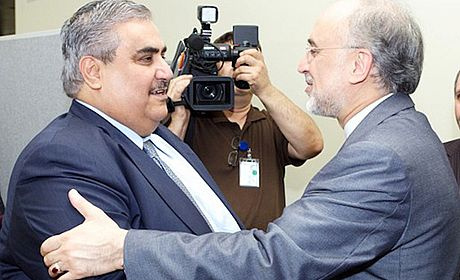Manama’s White Flags For Tehran

Bahrain reinstated its ambassador in Iran, more than a year after recalling its envoy. In March 2011, Bahraini ambassador left his office following escalation of mass protests in that country and intensification of propaganda conflict between Tehran and Manama in protest to what was called Iran’s intervention in Bahrain’s events. At the same time, in protest to the arrival of Peninsula Shield Forces to Bahrain, Tehran also retaliated by recalling its envoy from Manama. Iran has not announced yet any decision for a similar move to send back its envoy. Iran's Deputy Foreign Minister Hossein Amir-Abdollahian has said that due to continued suppression of protesters in Bahrain, Islamic Republic has no plan for the time being to reinstate its ambassador to Manama.
In late August, Bahrain raised another white flag for Tehran. Manama sent its Foreign Minister to NAM Summit in Tehran. Sources have informed Bahrain Observer that high-level political consultations had been made for this visit and Tehran had promised that there would be no word against Bahrain in that summit as the respect for the Bahraini guest would be observed. Iran Foreign Minister Ali Akbar Salehi met his Bahraini counterpart at the sideline of the summit. It was the second diplomatic meeting between two sides since the start of the uprising in Bahrain. Two Foreign Ministers met for the first time in New York last year. Iranian media and religious circles criticized Salehi for that meeting. However, last week’s meeting did not bring about considerable criticism. After the Tehran summit, Manama just like Cairo, through diplomatic channels, wanted Tehran’s apology over Persian mistranslation of Morsi’s speech by the interpreter of Iran’s state TV who replaced the word "Syria" with "Bahrain". Furthermore, Bahraini Foreign Minister called for Iran’s apology. But apart from this issue, Tehran’s treatment of Bahraini Foreign Minister during the summit was cordial and diplomatic and Iranian officials did not mention any name of Bahrain in their speeches. Bahrain News Agency that reflected the meeting between Salehi and Sheikh Khalid bin Ahmed Al-Khalifa said two sides also discussed expansion of bilateral ties.
However, during the past one and a half years, Manama’s official propaganda has accused Tehran of interfering in Bahrain’s internal affairs. Meanwhile, Bahrain Independent Commission of Inquiry (Bassiouni Commission) which was established by King Hamad to consider developments of first few months of the crisis, cleared Iran in its final report from any involvement in Bahrain’s events and confirmed that it had not received any evidence proving Iran’s involvement in the unrest.
In the meantime, there have been some indications recently of Manama’s willingness to come to an understanding with the opposition. Last month, Bahraini Crown Prince Sheikh Salman asked security forces to show some restraint in confronting protesters. Also, after a two-month strict ban on demonstrations, Bahrain’s interior ministry allowed street protests. On August 30, concurrent with the NAM summit and Foreign Minister of Bahrain’s presence in Tehran, tens of thousands of protesters staged a peaceful demonstration with an official permission.
It seems that Manama has acknowledged that a solution to the current crisis which has in past two years paralyzed its political and economic life cannot be reached without calm relations with Tehran. On the other hand, the main opposition group Al-Wefaq has always acknowledged that any tension between Tehran and Riyadh and Tehran and Manama is not beneficial to the Bahraini people.
Bahrain is a small island with diverse political-religious and ethnic structure which has been involved in a very complex crisis. The presence and influence of different domestic, international and regional players in the country have more complicated the situation. This island hosts the oldest US military base (US Navy’s Fifth Fleet). This is while the ruling establishment has strong economic and security ties with its big neighbor Saudi Arabia. Iran also has influence in Bahrain’s society and is capable of affecting developments there. Since the beginning of the crisis, three influential powers in Bahrain have not shown any inclination towards collective diplomacy. The US and Saudi Arabia have particularly not shown any willingness to involve Iran in solving this crisis.
Is it time for Iran to be involved in finding diplomatic solutions for Bahrain? We should wait and see what the Iranian reaction to Manama’s white flags will be and whether they will use this opportunity to boost their diplomatic role in this crisis.

